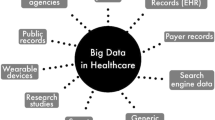Abstract
The proliferation of desktop computing has once again rekindled the interest in making computerized tools available to managers and other decision makers. This paper elaborates on a model that integrates data, knowledge, and model management and shows how decision support systems (DSSs) can be extended to support managers in a truly novel way. The model, the Knowledge/Data Model (KDM), is explained and the significance of its applicability to the management of data, knowledge, and models is illustrated through several examples. KDM continues to evolve and is being applied to domains from computer chip design to production and inventory management systems.
Similar content being viewed by others
References
L.M. Applegate, B.R. Konsynski and J.F. Nunamaker, Model management systems: Design of decision support, Decision Support Syst. 2(1986)81–91.
S. Banerjee and A. Basu, A knowledge based framework for selecting management science models,Proc. 23rd Annual Hawaii Int. Conf. on System Sciences, Kailua-Kona, Hawaii (IEEE Computer Society, 1990).
J. Banks and J. Carson,Discrete-Event System Simulation (Prentice-Hall, Englewood Cliffs, NJ, 1984).
R.W. Blanning, A relational framework for model management in decision support systems, in:DSS-82 Transactions (The Institute of Management Sciences, Providence, RI, 1982).
R.W. Blanning, A relational framework for join implementation in model management systems, Decision Support Syst. 1(1985)69–85.
R.W. Blanning, An entity-relationship approach to model management, Decision Support Syst. 2(1986)65–72.
R.H. Bonczek, C.W. Holsapple and A.B. Whinston, The evolving roles of models in the decision support systems, Decision Sci. 11(1980)337–356.
R.H. Bonczek, C.W. Holsapple and A.B. Whinston,Foundations of Decision Support Systems (Academic Press, New York, 1981).
R.H. Bonczek, C.W. Holsapple and A.B. Whinston, The evolution from MIS to DSS: Extension of data management to model management, in:Decision Support Systems, ed. M.J. Gintzberg, W. Reitman and E.A. Stohr (North-Holland, Amsterdam, 1982).
R.H. Bonczek, C.W. Holsapple and A.B. Whinston, Specification of modeling and knowledge in decision support systems, in:Processes and Tools for Decision Support, ed. H.G. Sol (North-Holland, Amsterdam, 1982).
D.R. Dolk, The use of abstraction in model management, Doctoral Dissertation, University of Arizona (1982), unpublished.
D.R. Dolk, Data as models: An approach to implementing model management, Decision Support Syst. 2(1986)73–80.
D.R. Dolk and B.R. Konsynski, Knowledge representation for model management systems, IEEE Trans. Software Eng. SE-10(1984)619–628.
J.J. Elam, Model management systems: A framework for development, in:Proc. 1980 Southeast American Institute for Decision Sciences (Decision Sciences Institute, Atlanta, GA, 1980).
J.J. Elam, J.C. Henderson and L.W. Miller, Model management systems: An approach to decision support in complex organization, in:Proc. 1st Int. Conf. on Information Systems (Society for Information Management, Chicago, IL, 1980).
A.M. Geoffrion, The formal aspects of structured modeling, Oper. Res. 37(1989)30–51.
A,M, Geoffrion, An introduction to structured modeling, Manag. Sci. 33(1987)547–588.
P.G.W. Keen and M.S. Scott Morton,Decision Support Systems: An Organizational Perspective (Addison-Wesley, Reading, MA, 1978).
L. Kerschberg and J. Pacheco, A functional data base model, Monograph Series Technical Report, Portificia Univ. Catolica do Rio de Janeiro, Brazil (February, 1976).
K.J. Kochut, J.A. Miller and W.D. Potter, Design of a CLOS version of active KDL: A knowledge/data base system capable of query driven simulation, in:Proc. 24th Annual Simulation Symp. (1991).
B.R. Konsynski and R.H. Sprague, Future research directions in model management, Decision Support Syst. 2(1986)103–109.
M.W. Lawless, A. Feinberg, A. Glassman and W.C. Bengtson, Enhancing the chances of successful OR/MS implementation: The role of the advocate, OMEGA 10(1986)107–114.
T. Liang, Development of a knowledge-based model management system, Oper. Res. 36(1988)849–863.
T. Liang, Integrating model management with data management in decision support systems, Decision Support Syst. 1(1985)221–232.
T. Liang and C.V. Jones, Meta-design consideration in developing model management systems, Decision Sci. 19(1988)72–92.
J.A. Miller, J. Arnold, K.J. Kochut, A.J. Cuticchia and W.D. Potter, Query driven simulation as a tool for genetic engineers, in:Proc. Western Conf. on Computer Simulation: Simulation in Engineering Education, Newport Beach, CA (January 1992), to appear.
J.A. Miller, K.J. Kochut, W.D. Potter, E. Ucar and A.A. Kesking, Query driven simulation using active KDL: A functional object-oriented database system (FOODS), Int. J. Comput. Simul. 1(1991)1–30.
J.A. Miller, W.D. Potter, K.J. Kochut and O.R. Weyrich, Model instantiation for query driven simulation in active KDL, in:Proc. 23rd Annual Simulation Symp. (April, 1990).
L. Orman, Design criteria for functional data bases, Info. Syst. 10(1985)207–217.
W.D. Potter, KDL-ADVISOR: A knowledge/data based system written in KDL, in:Proc. 21st Annual Hawaii Int. Conf. on System Science (January, 1988).
W.D. Potter, J. Miller and K. Kochut, Supporting an intelligent modeling environment using active KDL object-oriented database programming language, in:Proc. 21st Annual Pittsburgh Conf. on Simulation and Modeling, Pittsburgh, PA (1990).
W.D. Potter and R.P. Trueblood, Traditional, semantic, and hyper-semantic approaches to data modeling, IEEE Comput. (June, 1988) 53–63.
W.D. Potter, R.P. Trueblood and C.M. Eastman, Hyper-semantic data modeling, Data Knowledge Eng. 4(1989)69–90.
W.D. Potter and L. Kerschberg, A unified approach to modeling knowledge and data, in:Proc. IFIP TC2 Conf. on Knowledge and Data (DS-2), Algarve, Portugal (1986).
D. Shipman, The functional data model and the data language DAPLEX, ACM Trans. Database Syst. 6 (March, 1981).
H. Simon,The New Science of Management (Harper and Row, New York, 1960).
R.H. Sprague and E. Carlson,Building Effective Decision Support Systems (Prentice-Hall, Englewood Cliffs, NJ, 1982).
D. Tsichritzis and F. Lochovsky,Data Models (Prentice-Hall, Englewood Cliffs, NJ, 1982).
L. Wang, A geographic information system based on the knowledge/data model, Master Technical Report, University of Georgia (June, 1991).
B. Buchanan and E. Shortliffe,Rule-based Expert Systems (Addison-Wesley, Reading, MA, 1985).
Author information
Authors and Affiliations
Rights and permissions
About this article
Cite this article
Potter, W.D., BYRD, T.A., Miller, J.A. et al. Extending decision support systems: The integration of data, knowledge, and model management. Ann Oper Res 38, 501–527 (1992). https://doi.org/10.1007/BF02283663
Issue Date:
DOI: https://doi.org/10.1007/BF02283663




